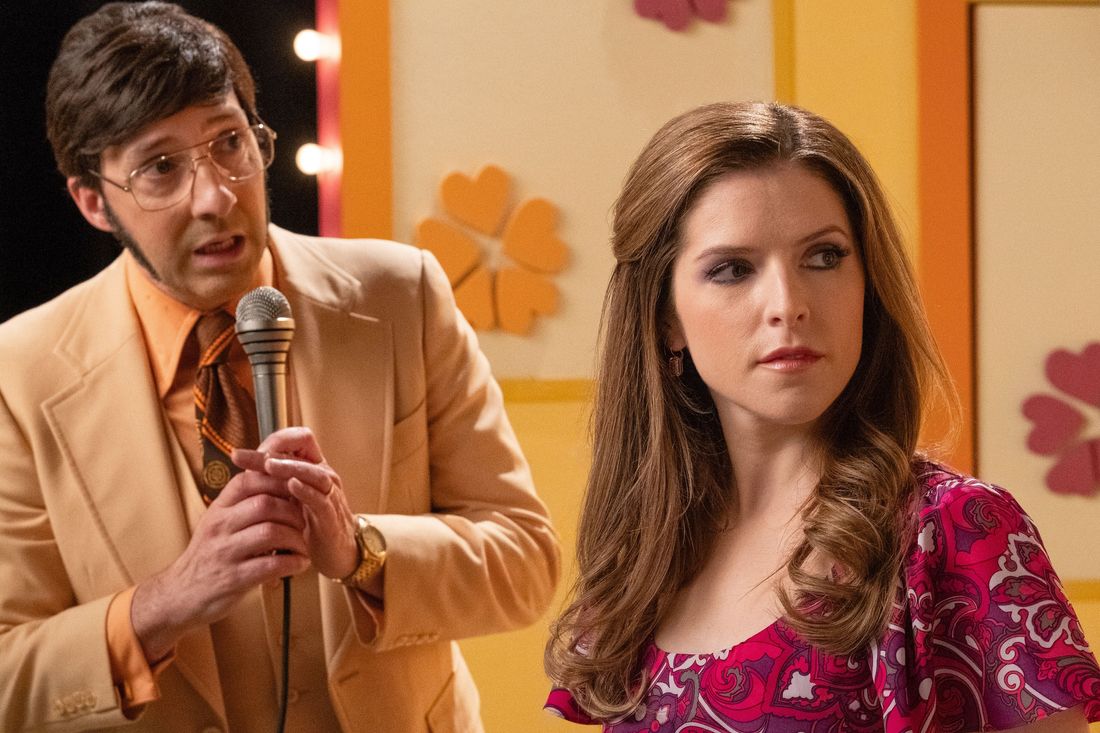
As a cinephile with a penchant for dark narratives, I found myself both intrigued and underwhelmed by Anna Kendrick’s directorial debut, “Woman of the Hour.” The film’s unique premise – a serial-killer drama intertwined with a grim portrayal of Hollywood’s sexist underbelly – was certainly captivating. However, the execution seemed to fall short of its potential.
It’s surprising that Anna Kendrick’s first directorial project might be a dark serial-killer story, but perhaps that’s the intention. Known predominantly for her roles in comedies and musicals, Anna takes on the character of Cheryl Bradshaw, a Columbia graduate struggling in Hollywood during 1978. Despite her hard work, she fails to secure any roles, partly because casting directors seem more interested in whether she’ll smile or do nudity rather than her acting skills. Overhearing them whisper about her perceived anger, Cheryl finds herself in a tough spot, with her neighbor and fellow actor Terry (Pete Holmes) offering only false support while secretly trying to pursue a romantic relationship. With few alternatives left, Cheryl hesitantly agrees to appear on ‘The Dating Game’, hoping it will boost her visibility. In this era where women are harshly judged based on their appearance and charm, someone with loftier aspirations is easily overlooked.
Additionally featuring on the same episode of “The Dating Game” as Contestant Number 3 is Rodney Alcala, portrayed by Daniel Zovatto, a character we encountered earlier in the movie’s opening scene, which took place in Wyoming, 1977. He was photographing a young woman there, only to later strangle her. This chilling tale is based on an extraordinary true event: Alcala was indeed a notorious serial killer and rapist who terrorized both New York and California for over a decade. Amidst his shocking crime wave – after being featured on the FBI’s Ten Most Wanted List and serving two prison sentences – he made an appearance on this iconic dating show.
The film intercuts Cheryl’s appearance with several of Alcala’s crimes as it jumps around the timeline. We see him in 1971, killing a flight attendant in New York who’s asked him for help moving some of her belongings into a new apartment. We see him in 1977, working as a typesetter for the Los Angeles Times, as he tries to lure a young man into a solo photo shoot. A promising director, Kendrick stages these sequences artfully, without relying on cheap suspense thrills or exploitative gore. She’s got a good eye, and a deft editing hand; she knows exactly when to cut away, when to provide a telling ellipsis. The overarching tone of these sequences is not suspense but sadness.
The film’s underlying theme portrays the distressingly cyclical pattern in this narrative. Despite numerous red flags and frequent encounters with the authorities, Alcala managed to function unchecked for an extended period. Interestingly, the plotline also hints at something else: In a society filled with lecherous louts and fools, Alcala appears as a considerate, intellectual figure. As portrayed by Zovatto, he is well-informed, courteous, even somewhat appealing. He’s a graduate of UCLA film school and keeps abreast of independent cinema and renowned literature. He compliments one woman by comparing her to Linda Manz in “Days of Heaven.” He discusses Sam Shepard and Edward Albee with Cheryl. He speaks eloquently and says the appropriate things. However, he is indeed a psychopath, and occasionally, he reveals the beast hidden within through his words or actions.
Regrettably, the screen portrayal of “Woman of the Hour” doesn’t quite live up to expectations. The narrative strategy, which revolves around a dating game show similar to “The Dating Game,” unfortunately gives the protagonist Cheryl an underwhelming treatment, with her being objectified by virtually everyone, including Tony Hale in his slick, oily performance as the host. This approach could potentially create an interesting thematic statement, but it also leads the film into a predictable and dry rhythm, making the narrative feel overly predetermined. Even those unaware of how Alcala’s actual appearance on “The Dating Game” unfolded may anticipate some plot points.
As a devoted cinephile, I found the film’s non-linear narrative to be thought-provoking yet somewhat disjointed. The story unfolds fragments of a serial killer’s life, leaving us grasping for a deeper understanding of his psyche, and unfortunately, not much more is revealed about Cheryl, a character whose real-life details are scant.
Read More
- W PREDICTION. W cryptocurrency
- AEVO PREDICTION. AEVO cryptocurrency
- AAVE PREDICTION. AAVE cryptocurrency
- PRCL PREDICTION. PRCL cryptocurrency
- Top Gift Ideas for Your League of Legends-Obsessed BF on a Budget
- WIF PREDICTION. WIF cryptocurrency
- PENDLE PREDICTION. PENDLE cryptocurrency
- GBP JPY PREDICTION
- SHX PREDICTION. SHX cryptocurrency
- LTC PREDICTION. LTC cryptocurrency
2024-10-19 00:54